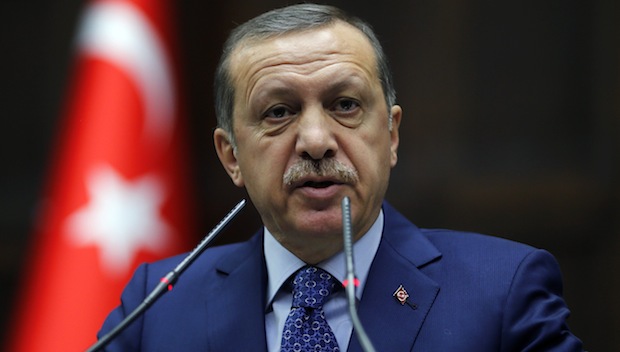Turkish Prime Minister Recep Tayyip Erdoğan paid his first visit abroad after winning the March 30 local elections by travelling to Azerbaijan on April 4. Before leaving for the capital Baku he told a press conference at Istanbul’s Atatürk Airport he was happy to see that the foreign policy his government has been implementing had played one of most important roles in gaining the 44 percent of the vote he received.
Almost 10 days before that press conference, the Turkish people had been shocked by leaked recordings of a bugged secret security meeting on Syria at the Turkish Foreign Ministry which were posted on YouTube.
The bugging, the leak of the recording, the content of the discussion, and the incident that lead to that meeting all in a sense symbolized the failure of Turkish foreign policy in Syria.
Relying on the Muslim Brotherhood-affiliated opposition in Syria has placed Turkey in a position where it is confronted by cross-border terrorism from a neighboring country ravaged by conflict.
And Syria is only a part of the story. Turkey’s policy in Egypt has been a failure once again due to the decision to put all its eggs in the Muslim Brotherhood’s basket under former Egyptian president Mohamed Mursi.
The European Union, which Turkey wants to join, postponed an accession committee meeting last week in order to avoid open disagreements. Later on it was announced that the decision to postpone was based on a mutual consensus. It was obvious that if the meeting had gone ahead, EU officials would have criticized Turkey because of its recent attempts to ban social media sites Twitter and YouTube; Turkish officials would have responded with defiance. The ban on Twitter came after it was used to release a shower of tapes, fueling corruption allegations against Erdoğan and his close circle, while the YouTube ban followed the Foreign Ministry leaks. Both the bans were subsequently lifted by the Constitutional Court, which further upset Erdoğan.
When he was appointed Foreign Minister in 2009, Ahmet Davutoğlu promised to pursue a “zero problems with neighbors” policy. However, now Turkey doesn’t have ambassadors in three important countries in the region: Egypt, Syria and Israel. But Erdoğan is happy with this as long as it pays off for him in domestic Turkish politics, because he manages to portray all those failures as the inevitable cost of Turkey’s role—in other words, his own role&8212;as the protector of all the oppressed people of the region, especially the Muslim world. One of his chief advisors, İbrahim Kalın, describes this stance as a “precious loneliness.”
Erdoğan is at odds with Israel because he stood alone in protecting the rights of Palestinians in the Hamas-ruled Gaza Strip. He is at odds with Syria because he is there to support Sunni Muslim majority rights there against the evil President Bashar Al-Assad (with whom he spent family holidays before the conflict and used to call him “my brother”). He is at odds with Egypt (and Saudi Arabia because of its support for Abdel-Fattah El-Sisi) because he defends the rights of those Egyptians who voted for their Muslim Brotherhood leader who was then toppled by a coup. Erdoğan used the four-finger “Rabaa” sign of Egypt’s Muslim Brotherhood throughout his election campaign.
This is why Erdoğan is happy with his foreign policy, not because of its diplomatic successes, but because of its domestic payoff, which keeps him ruling the country.
It is possible we will see renewed contact with Israel in the coming days or weeks, but that does not mean a change in foreign policy. It would simply mean the fulfillment of a promise to US President Barack Obama and Israeli President Benjamin Netanyahu almost a year after making it. But even that would depend on whether it would allow him to enter Gaza as its “savior” ahead of the presidential elections in August.
On the other hand there is an urgent need for a revision, or a fine-tuning of Turkey’s foreign policy. There are some steps being taken in Cyprus. If it brings positive results, that could be a game-changer, not only in Turkey’s relations with EU, but also in European energy policies if the transportation of gas from Cyprus and Israel to Europe goes through Turkey.
There is also Kurdish and Azeri gas and oil to be transported to Europe via Turkey—which would not make Russia and Iran very happy—depending on new steps in diplomacy. But diplomacy for Erdoğan is only as useful as it serves him in domestic politics.
To see any change in Turkish foreign policy, one should wait for the outcome of the presidential elections. Whether Erdoğan becomes president or not, changes in the direction of Turkish foreign policy would be preceded by changes in the cabinet.
The counterpoint to this article can be read here.
